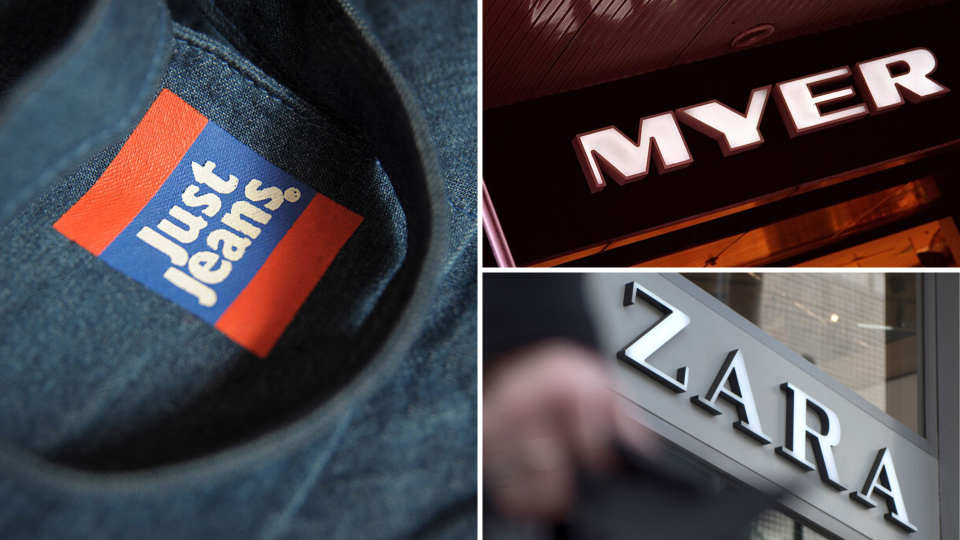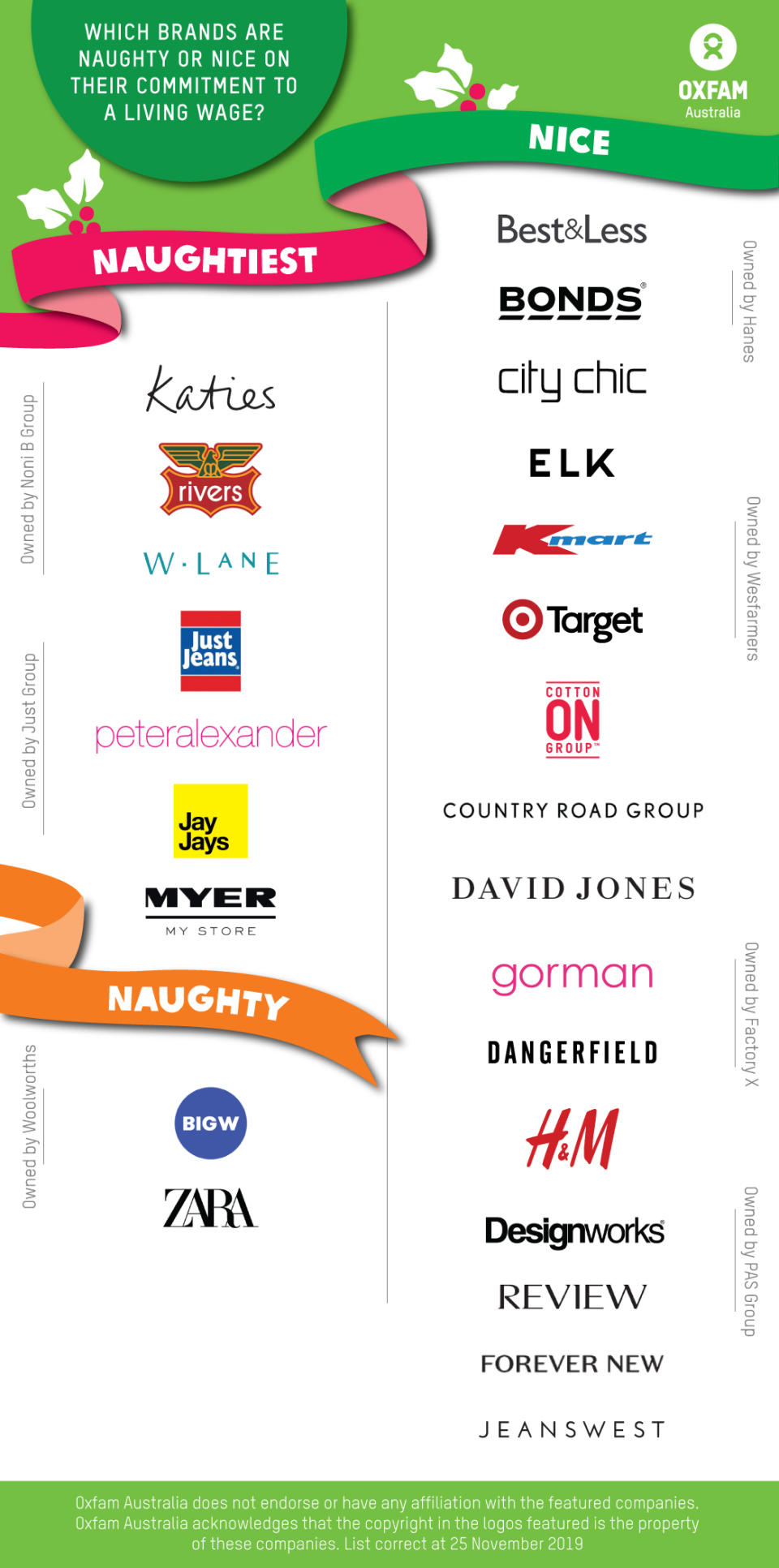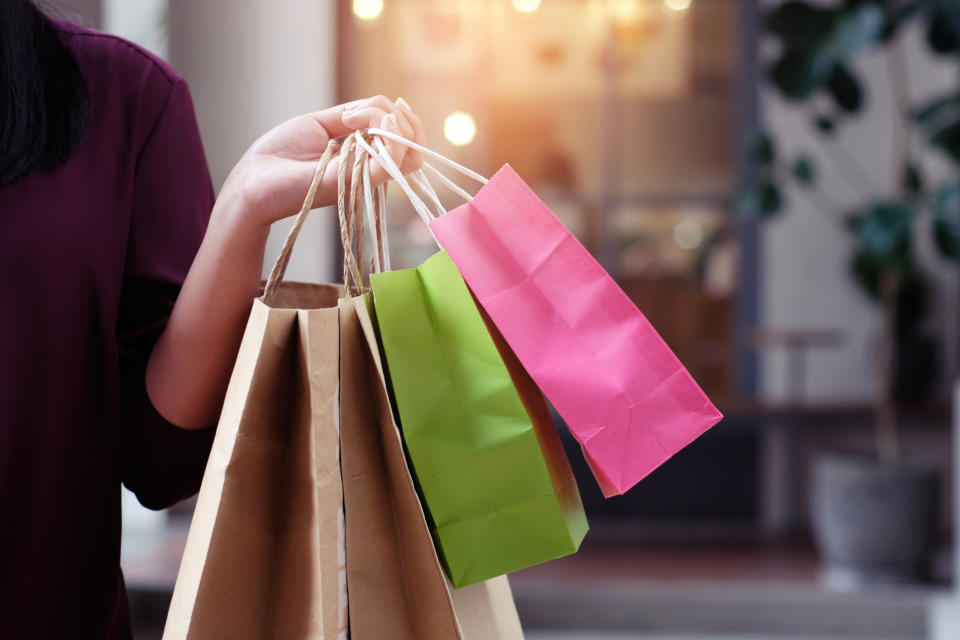The 9 stores to avoid this Christmas

Christmas is considered a time for charity, giving and compassion.
But according to Oxfam’s 2019 Naughty or Nice List, there are several major Australian brands which don’t prioritise these values.
Oxfam launched the Naughty or Nice List in 2013 after the Rana Plaza factory collapse in Bangladesh killed at least 1,132 underpaid garment workers, and injured another 2,500.
The list, which measures Australian fashion brands on their commitment to paying living wages for garment makers, named Katies, Rivers, W. Lane, Just Jeans, Peter Alexander, Jay Jays and Myer as the “naughtiest” brands this year.
Big W and Zara were also considered “naughty”.

“While a number of iconic Australian brands have come on board and taken the significant first step towards ensuring the payment of living wages, others are dragging their feet,” Oxfam Australia labour rights lead Sarah Rogan said.
“The brands on our naughtiest list ... have not only failed on living wage commitments, but have not even taken the step of becoming transparent by bringing their factory lists out of hiding.
Related story: Why THE ICONIC wants you to care about friendly fashion
Related story: Zara to go 100% sustainable by 2025
Related story: Patagonia refuses to make ‘finance bros’ any more vests
“Meanwhile, Big W is on our naughty list for failing to make a credible commitment on living wages, while Zara is also on the naughty list this Christmas – although the global fashion giant has made a commitment on living wages, it has still failed to publish the details of the factories where its clothes are made.”
Rogan said the brands on Oxfam’s nice list, including Target, Kmart, David Jones and H&M, have been recognised for including an appropriate definition of a living wage and have met at least two key milestones in paying garment workers those wages.
But, the work isn’t done yet.
“While the ‘nice’ brands are to be commended for leading the way, there is still a long way to go to ensuring the payment of living wages that will allow the women making out clothes to live decent lives,” Rogan said.
“The fact is that right now, not all workers are being paid enough to afford a decent life for themselves and their families.”
Is shopping at ‘nice’ stores enough?

According to the head of sustainability consultancy firm Eco-Age, Charlotte Turner, an endless cycle of consumption is also to blame.
A 2019 PayPal study found that nearly one-in-five Australians feel sales FOMO (fear of missing out), and make an average $108 in impulse purchases every month.
But the sales and purchase cycle fuels a “false economy”, where the idea of what is new and what is an appropriate price is constantly eroded.
“Living in a society where the ‘new’ is constantly pushed, it can be difficult to change this behaviour,” she told Yahoo Finance in July.
“Constantly buying cheap clothes is actually a false economy – you are buying clothes which are not designed to last.”
“However, constantly buying cheap clothes is actually a false economy – you are buying clothes which are not designed to last, and in the long run probably spending more than you would on fewer higher quality garments that will last a much longer time, particularly if well cared for.”
And the cheaper the clothes, the more likely the person who made the clothes is significantly underpaid - although more expensive brands are certainly not innocent of underpaying garment workers.
How can I do better?
As a shopper, it comes down to making more conscious decisions.
Australian app, GoodOnYou helps shoppers understand more about how their favourite brands are performing in terms of ethics and the environment.
And this Christmas, it’s campaigning for more thoughtful shopping.
“This Friday, the world will once again fall under the Black Friday spell,” the app said in an Instagram post.
But rather than fall into the FOMO trap, instead shoppers should ask themselves questions like: “How much do I already own?” and “How much will I wear it?”
“It’s so easy, and so human, to feel some major FOMO when you’re surrounded by messages claiming that you need to take advantage of these amazing deals on items that will make your life better.
“But we’re here to ask you to consider how good your life is already, without the excess.”
101 brands to avoid
Baptist World Aid in April this year also released its ranking of Australian fashion brands, and found that 101 Australian brands are performing poorly.
It scored these brands D+ or lower:
Abercrombie & Fitch* D-
Abercrombie Kids* D-
Airflex D
Amber Rose D
Ally Fashion* F
Amber Rose D
Autograph D
Baby City* F
Bardot D+
Bardot Junior D+
Beare & Ley* F
Bec and Bridge* F
Betts D
Bloch* F
Capture D+
Capture European D+
Camilla and Marc* F
Cinori D
Co Co Beach* F
Coles D+
Colorado D
Cooper by Trelise* F
Cooper St* F
Crossroads D
Darn Tough D+
Decjuba* D
Diana Ferrari D
Django & Juliette D
Emerge D+
Euro Edit D+
Ezibuy D+
Farmers* F
Forever 21* D
Fruit of the Loom* D+
Gamins D
Gazal* D
Gilly Hicks* D
Gracehill D+
Heine D+
Hollister Co.* D
Hunting & Fishing New Zealand D+
I love Billy D
Isabella Rossi D
Jasmine & Will* F
Jump* F
Kachel* F
Kate Sylvester* D+
Katies D
Lemonade* F
little trelise* F
Liz Jordan D
Lover* F
Lowes* F
Lynx D
Maggie T D
Merric* F
Mia Lucce D+
Midas D
Millers D
Mirrou D
Mix* D+
Mollini D
Non Sense* F
Noni B D
Oxford D
P.E. Nation* F
Pavement* F
Petals* F
Ping Pong* F
Pom Pom* F
Rebecca Vallance* F
Rivers D
Rockmans D
Russel Athletic* D+
Sara D+
Scram* F
Showpo* F
Silent D by Django & Juliette D
Simon de Winter D+
South Cape D+
Spalding* D+
Supersoft by Diana Ferrari D
3 Wise Men* F
T&T* F
Table Eight D
TEMPT D
The Baby Factory* F
Tigerlily* D
Together D+
Top End D
Trelise Cooper* F
Urban D+
Valleygirl D
Vanity Fair* D+
W.Lane D
Wanted D
Wax* F
Wish* F
WORLD* D
Zom-B* F
Zu D
Brands marked with the * did not respond for the Baptist World Aid report.
Interestingly, Baptist World Aid described Zara as performing well - contrasting with Oxfam’s report.
Baptist World Aid bases its report on the supply chain, including the risk of forced labour, child labour and exploitation.
It also considers environmental management systems, transparency and labour rights policies.
“The beginning of the supply chain is where the risk of child labour, forced labour and exploitation is most prevalent,” Baptist World Aid CEO John Hickey said.
Make your money work with Yahoo Finance’s daily newsletter. Sign up here and stay on top of the latest money, news and tech news.

 Yahoo Finance
Yahoo Finance 
